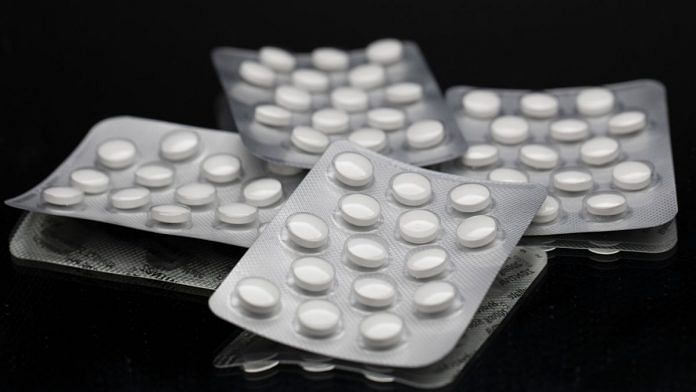
New Delhi: The Narendra Modi government has posted drug inspectors at manufacturing sites of hydroxychloroquine (HCQ) to monitor daily production of the drug that is increasingly being touted as the best bet for the treatment of Covid-19.
HCQ also holds strategic value to the Government of India as a number of countries, particularly the US, have turned to New Delhi for its supply.
The Central Drugs Standard Control Organisation (CDSCO), under the Ministry of Health and Family Welfare, has posted drug inspectors at nine production sites of two pharmaceutical companies — Mumbai-based Ipca Labs and Ahmedabad-based Zydus Cadila.
The two companies are the largest producers of HCQ in India.
“Our objective is to oversee the day-to-day production of the drug including how much raw material is being procured, how much of it is being used, how much tablets are produced and how many of them are sold and where,” an official from the health ministry told ThePrint. “The idea of posting inspectors is to prevent the drug from going into the black market. We don’t want companies to misreport stock.”
The official added, “Drug inspectors have been posted at five sites of Ipca Labs and at four sites of Zydus Cadila.”
ThePrint had reached out to Ipca Labs and Zydus Cadila via email for their comments but no response had been received till the time of publishing. This report will be updated when they respond.
Also read: ICMR advises ‘pool testing’ in low-infection areas to increase number of Covid-19 tests
The Covid-19 drug
Hydroxychloroquine, a popular anti-parasitic medication, has been around since the 1940s. It is used to treat malaria.
The drug is a derivative of chloroquine and has fewer side-effects.
Chloroquine works by increasing the levels of haem or heme — a substance toxic to the malarial parasite — in the blood. This kills the parasite and stops the infection from spreading.
According to some Chinese studies, “chloroquine has strong anti-viral effects on SARS-CoV infection of primate cells”.
SARS-CoV-2 is the novel coronavirus that causes the Covid-19 infection.
According to price and drug availability watchdog National Pharmaceuticals Pricing Authority (NPPA), India has a capacity to produce 40 metric tonnes of HCQ, which means 20 crore tablets of 200 mg per month.
The country consumes around 20-27 lakh tablets per month mostly for rheumatoid arthritis and under malaria elimination programmes.
Also read: Andaman & Nicobar has started conducting ‘pool tests’ for Covid-19 — first in the country
Drawing global attention
The drug drew global attention after US President Donald Trump last month called it a “game changer”, and proposed its use for Covid-19 cases.
The US later handed “sizeable” orders to Indian pharma firms, following which, around 30 countries including Brazil and several SAARC nations reached out to India for HCQ supply.
The Indian government also procured 10 crore HCQ tablets for domestic consumption.
The central government’s affordable medicines scheme, Jan Aushadhi Pariyojana, further rolled out tenders for procurement of 1 crore tablets for its retail outlets.
Procurement is necessary as Indian government has advised consumption of HCQ for two categories — healthcare workers dealing with Covid-19 patients and household contacts of laboratory-confirmed cases.
Also read: After HCQ, countries begin to call India for the humble pain and fever tablet paracetamol

Please inform if Bengal Chemicals and Pharmaceuticals Ltd. based in Kolkata could obtain raw materials for manufacturing HCQ. It is time India must plan for total self reliance for all kinds of drug manufacturing. It is of strategic requirement.
India should stop import of raw materials for manufacturing medicines.